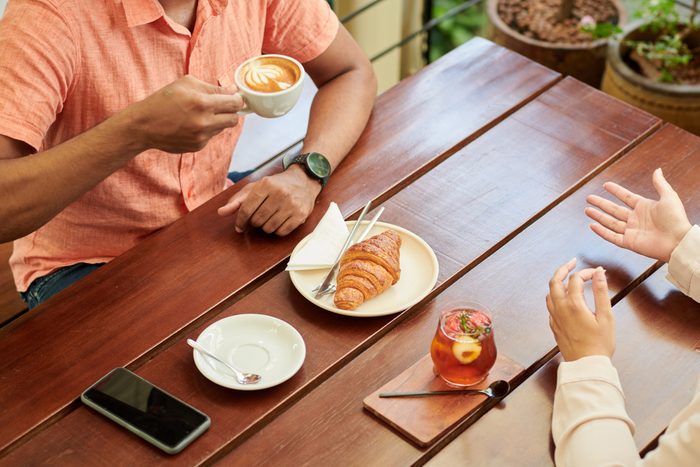
Avoid these bad conversation habits
Rude conversation habits can be conversation-ending, but more often, they’re subtle and insidious. Most people aren’t trying to be huge jerks, but even making these small-talk etiquette mistakes could lead to big communication issues down the line. “Our culture is getting more relaxed about etiquette in general but especially in how we speak with each other—moving from formalities to being more casual in our conversations,” says Jan Goss, an etiquette expert and founder of Show Up Well, an etiquette consulting agency. “But you have to be careful that casual and informal doesn’t slide into rude or impolite.”
The trick to finding that line? Understand basic etiquette rules and use them in a compassionate way, she advises. “Kindness is the heart of polite conversation. Put yourself in the other person’s shoes and imagine how you would feel if someone spoke to you that way,” she says.
We asked Goss and other etiquette experts to share the top conversation mistakes they see people making—and how to fix them, so you’ll always know what to say.
Get Reader’s Digest’s Read Up newsletter for more etiquette, humor, cleaning, travel, tech and fun facts all week long.

Being brutally honest
You may think that “telling it like it is” is a good habit. Or that a true friend will always tell the truth, whether they like it or not. But this tends to be a justification rude people use to rationalize their bad habit. “The problem with brutal honesty is that it’s brutal, and that’s always going to be rude,” Goss says.
While it is important to be honest, there’s a lot of middle ground between lying and going scorched-earth on someone’s feelings, she says.
What to do instead: First, figure out if what you want to tell the person is actually any of your business. (Parenting, weight loss and religion are popular not-your-business topics.) Then, ask if you’re the person who should be telling them at all. If either answer is no, then you should refrain from saying anything.
If you feel like your opinion or conversation will genuinely help the other person or if they asked you for your advice, then find a way to say it in a kind way. You can do this by using a compliment sandwich: Giving a compliment, offering a criticism and finishing with a compliment.
Posting conversations online
Blame social media for this rude habit: It’s becoming very commonplace to post conversations—funny, serious or even ongoing arguments—online, so friends and strangers can weigh in. You may think you’re just sharing a cute story from one of your kids, venting about a snarky cashier or getting an outside perspective on your marital argument, but posting conversations without the other person’s explicit permission goes against all netiquette rules. In some cases, it can even be a betrayal of the relationship, says Diane Gottsman, national etiquette expert and author of Modern Etiquette for a Better Life. Not to mention, if you’re posting things your children have said, it could compromise their safety.
Posting conversations on your Facebook, Instagram, TikTok or Reddit welcomes people into the conversation who shouldn’t be a part of it—and they’re only getting your point of view. Gottsman adds that it’s also common for people to embellish these conversations to make them funnier or more upsetting to create more engagement.
“We’ve all been given a public microphone,” Gottsman says. “Don’t use yours to expose, manipulate or even just repeat conversations with others.”
What to do instead: Ask permission. If you must post something, make sure you’re getting the other person’s express permission. This is true even if you change their names or just hint at who they are. And make sure you’re following proper texting etiquette and email etiquette as well.
Being too agreeable
People pleasers, we hear you. When you’re in a conversation with someone and want to be pleasant and polite, it’s easy to think the best tactic is to be agreeable. At first glance, this may seem the opposite of rude—after all, you’re trying to be helpful and kind. But agreeing with everything someone says or saying yes to discussing something or doing a favor asked of you is a sign of poor boundaries, says Bonnie Tsai, etiquette expert and founder and director of Beyond Etiquette. “Saying yes to everything may feel great at the moment, but it is quite rude because it will end up eventually hurting your relationship, either due to resentment or exhaustion,” Tsai says.
What to do instead: Learn to be comfortable drawing boundaries in conversation, including what you will and won’t discuss, what you are able to do and how much time you have. “Good boundaries make good friends,” Gottsman adds.

Interrupting
File this at the top of the list of rude conversation habits, say our experts. It’s not like we don’t all know that interrupting is rude—it’s one of the things people dislike most. So why do we still do it so often? “Sometimes, watching people, it’s like they can’t keep it in,” Gottsman says. “They’ll start making little noises or bouncing around or fidgeting, and then they’ll reach a point where they blurt it out.”
This is because sharing is an instinct programmed into us as social beings—and it’s a good instinct, as long as we’re all taking turns, she says. Honestly, it happens to everyone who likes chitchatting. Something pops into your head while your friend is speaking, and instead of listening to them, you interrupt them to share it.
While it may feel like you need to say something before you lose your train of thought, think again. Interrupting not only expresses a lack of interest or respect for the speaker, but it also stops people from sharing the pearl of wisdom they might have had at the end of their story, says Emilie Dulles, who has more than 29 years of experience in traditional etiquette.
What to do instead: Always let others finish their thoughts completely, unless what you have to say is an emergency, adds Tsai.
Overusing sarcasm
Some people have a very sarcastic sense of humor (and it’s often used as a self-defense mechanism, Gottsman notes). But sarcasm is a hit or miss in most conversations, especially if people don’t know you well, she says. If this is a new relationship, being sarcastic can seem like you’re making a joke at the other person’s expense. Or they may miss the joke altogether and be confused. Sarcasm is especially rude and inappropriate if you are communicating in settings that have a more formal standard, such as the office (making it one of the most unprofessional work habits) or with people who aren’t native speakers.
What to do instead: Be mindful of your audience and determine if it’s the right time or place. “If you have to ask whether or not it’s appropriate, it most likely is not,” says Tsai. If you do make a sarcastic comment that kills the mood, learn how to save awkward conversations.
Suffering from main character syndrome
We’ve all been there: Trapped in a conversation with someone who won’t stop talking about their dog, their job promotion, their spouse or all their problems. So why can’t we see how annoying it is when we do it? And make no mistake, we all do it sometimes, Gottsman says. It’s natural to talk about yourself—after all, who doesn’t want to be the most interesting person in the room?
But thanks to YouTube stars and Instagram influencers, many people have labeled the problem “main character syndrome,” which means acting like you’re the star of the show at all times. Everyone else is simply a supporting character.
“[People] want to be able to share their stories just like you want to share yours,” says Tsai. Not only is talking exclusively about yourself pompous, but monopolizing the conversation is just plain irritating and boring, says Julia Esteve Boyd, an international etiquette consultant.
What to do instead: It’s true that on the internet, these one-way conversations are incredibly common. But in real life, it’s rude. You may just be nervous and aren’t sure what to talk about, but whatever your reason, this is a habit you should quit. Don’t use the other person as your personal therapist or sounding board. The point of conversation isn’t to get all your thoughts out, Gottsman says. It’s to strengthen your relationship with the other person. A good habit is to ask questions about the other person.

Leaving your phone face up
Being distracted by your phone is an obviously rude conversation habit. But while you already know that scrolling through your phone while someone is speaking is a no-no, it’s also a bad habit to keep checking your notifications. Leaving your phone face up or holding it in your hand (or in your line of sight) makes it so you’re constantly being distracted by all those pings, dings and whooshes. This is a real problem in big group settings and is poor dinner-party etiquette.
“Our phones are great for connecting with those who are far away,” says Tsai. “However, it takes time away from those we are with at the moment.” This includes “just checking” your notifications on your phone or Apple Watch.
What to do instead: If you have something you need to keep an eye on—perhaps a call from a parent or a text from your child—explain the situation to the other person ahead of time. Then make any checks brief and don’t get sucked into other things on your phone. If there’s nothing urgent, putting your phone away entirely is a beautiful and polite signal to the other person that they are important to you and that you are truly listening.
One-upping the conversation
When a conversation turns into a debate, do you feel like you need to persuade the other person to your point of view? When someone shares something, do you feel like you need to let them know you do/have that too? Do you feel the urge to reference your superior experience or bring the conversation back to you? Always needing to one-up someone, be right or be the best, regardless of the topic, is rude. It can be quite common—and it’s a vibrant red flag of insecurity, says Gottsman. Rather than making you look cool or smart, dominating or one-upping the other person just makes you look tone deaf and is a big etiquette mistake.
What to do instead: Don’t worry so much about being right. “The important thing isn’t about being right or wrong, but understanding where each other is coming from and the ability to empathize with one another without judgment,” says Tsai. Someone else sharing their experience with you doesn’t require you to counter with your own. Staying positive and giving people a chance to talk are two polite conversation habits you can work on instead.
Oversharing or undersharing
When someone asks you how you’re doing, do you tell them all the ins and outs of your ongoing divorce and throw in a description of your recent stomach flu? Or do you clam up and dodge any personal questions?
Both oversharing (spilling your guts about everything) and undersharing (refusing to disclose anything remotely personal) can be rude because they place the burden solely on the other person, Gottsman says. “They either have to listen and be your therapist or do all the talking,” she says. “There’s a natural give and take in good conversations, and a polite conversationalist will find that balance.”
What to do instead: Deciding how much to disclose and to whom depends a lot on your relationship with the other person, Gottsman says. Your boss? Keep it light on the details. Your best friend? Spill away. The trick, she adds, is to watch the other person for signs that they are getting uncomfortable or bored. If you’re nervous and unsure what to say, use these conversation starters to get it flowing.

Teasing
There’s a fine line between funny teasing and ending up on the internet as a cautionary tale. Many times, teasing is simply humor for the group at the expense of one person—and that can be a high cost. How to find that line? It’s all about understanding the time, place and person, Tsai says. For instance, teasing your spouse about their gas may be funny when it’s just the two of you, but calling her “dynamite butt” in front of a group of friends will be humiliating.
It gets even dicier when you don’t know the other person well. What you may think is teasing may come across as racist, bigoted or mean. It’s key to be respectful of other people’s boundaries and sensitivities, regardless of gender or culture, Tsai says.
What to do instead: If you’re unsure about whether someone will appreciate being teased, just don’t do it, Tsai advises. Especially if you want to build a friendship or community with those you’re hanging out with. And if you do tease and it doesn’t go over well, immediately own it and apologize. Whatever you do, don’t double down on a rude joke.
Prepping your response before the story ends
Too many people don’t actually listen to a conversation intentionally. Instead, they are waiting for their turn to speak, Goss says. “People can tell when you’re not really listening, through your body language,” she says. Meaning, if you’re all up in your own head, running through the story you want to share, then you’ll stop making eye contact and replying appropriately or you’ll look zoned out.
What to do instead: Instead of thinking about what you want to say next, Dulles suggests taking a deep breath and ingesting fully what the other person says. Practice being a good listener. After a few seconds pass, it’s your turn to speak.
Turning every conversation into gossip
Celebrity gossip is a huge industry, and thanks to social media, regular gossip is becoming just as titillating, if not more. Even though most of us will acknowledge we don’t enjoy being talked about, gossip remains a very popular conversation topic. In fact, sharing information about others can even feel polite, like you’re talking about them out of concern, or feel like a bonding moment. But that is a deception, Goss says. Gossip is always rude and it hurts both of you, leading to comparison and envy, she says.
What to do instead: Whether you converse via phone or in person, the old adage holds true: If you have nothing nice to say, don’t say anything. And if someone else tries to bring up gossip, just change the subject. Staying away from gossip might actually help you boost your mood and feel more connected in your relationships.

Asking overly personal questions
Some questions are just too personal for casual or group conversations and can create a seriously awkward situation. Asking specific questions about health concerns, weight, family, sexuality, religion and politics are going to be taboo for most conversations. However, understanding the time, place and person is vital, Gottsman adds. Asking your sister about the results of her mammogram when it’s just the two of you is fine. Asking her about it over Thanksgiving dinner? Not fine.
What to do instead: Keep all conversational topics neutral. “Talk about your culture, another culture, food, travel, wine, hobbies, local news and general family questions,” says Boyd. If someone else starts in with intrusive questions, you can find a way to answer them without making things awkward. For example, if someone asks how much money you make, say, “Not enough!” Or if your cousin won’t stop asking when you’re having kids say, “I don’t know, but I may need a babysitter one day. Can I count on you?”
Reading the room incorrectly—or not at all
If there’s one thing you take away from this list of rude conversation habits, it’s the importance of reading the room. This expression is popular because it speaks to the need for self-awareness as well as the awareness of others, says Dulles. This can be tough, especially if you’re in a situation that isn’t familiar to you. But this isn’t all gut instincts; it’s a skill that can be learned, Goss says. This starts with learning how to read body language and how to be an active listener.
What to do instead: “Your conversation topics, tone and volume need to be streamlined to the setting and the people around you,” says Dulles. If you’re not sure, you can quietly ask a trusted friend. If you aren’t close with anyone there, avoid anything controversial.
Not improving your skills
There’s always room for improvement, even if you don’t think you’re guilty of these rude conversation habits. “Conversation etiquette ultimately stems from having respect and consideration for others,” says Tsai. If you aren’t sure whether your conversation habits come off as rude, ask your close friends and family to help you out. “They can help you be aware of any quirks or habits you have when you’re spending time with others that can be perceived as inappropriate,” says Tsai. More important, once you know these things, you can work on them and become an even better conversationalist.
What to do instead: The more practice you can have in different types of conversations, the better you’ll get and the more at ease you will feel. You can practice with friends, loved ones or join a group like Toastmasters.
Additional reporting by Emily DiNuzzo.
About the experts
- Jan Goss is the CEO and founder of Show Up Well consulting, which provides training in etiquette and leadership. She focuses on a common-sense approach that blends protocol with kindness. She has authored two books: Protocol Power and Bedroom Etiquette.
- Diane Gottsman is a national etiquette expert, founder of the Protocol School of Texas and author of Modern Etiquette for a Better Life.
- Emilie Dulles is the founder of Dulles Designs. She has more than 29 years of experience in traditional etiquette.
- Bonnie Tsai is the founder and director of Beyond Etiquette.
- Julia Esteve Boyd is an international etiquette consultant who has taught, trained and worked with members of royal families, politicians, the military and business people from all around the world.
